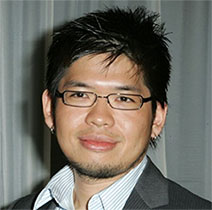A Visual Innovator and Entrepreneur, Steve Chen Sits at the Heart of Silicon Valley
Top Reasons to Join SPS Today!
1. IEEE Signal Processing Magazine
2. Signal Processing Digital Library*
3. Inside Signal Processing Newsletter
4. SPS Resource Center
5. Career advancement & recognition
6. Discounts on conferences and publications
7. Professional networking
8. Communities for students, young professionals, and women
9. Volunteer opportunities
10. Coming soon! PDH/CEU credits
Click here to learn more.
A Visual Innovator and Entrepreneur, Steve Chen Sits at the Heart of Silicon Valley
Humans have been fascinated with light and optics since prehistoric times, when the first “camera” was used to project upside down images onto cave walls. IEEE recently presented the world’s first Visual Innovation Award to showcase innovations that made great impact on human experiences with visual technology or are anticipated to do so in the near future.
Steve Chen, co-founder of YouTube, was a recipient of the award. I recently spoke with Steve on his exciting journey as a young professional starting his career in Silicon Valley, what advice he’d offer to young engineers interested in starting their own companies, and what earning the award means to him. Here’s what he had to say:
- Tell us about yourself: what was your early career like?
One of my pivotal decisions was attending the Illinois Mathematics Science Academy (IMSA) at the age of 14. I took the SAT early in high school and got accepted. I loved being surrounded by 14-year-olds who were curious about math and science – everyone’s interests were the same and there was a ton of knowledge sharing.
In high school, I was constantly sharing ideas and new ways to see the world because I was living with these kids. This time in my life also overlapped with when the internet started (between 1993-1996). This fueled my curiosity in computer programming because I had an opportunity to experiment on new, state-of-the-art computers. This is when I realized how blessed I was to be at IMSA.
I attended the University of Illinois after graduation and honestly wasn’t sure of the difference between computer science and computer engineering, or even electrical engineering. It was a coin toss to decide my major, but I understood it was an important decision. As I immersed myself in classes, and when I saw an overlap in curriculum for the various computer science and engineering paths, I knew I was going in the appropriate direction – one that would lead me to a career in technology and science.
Another milestone happened in 1999 when I was talking to Max Levchin, CTO and co-founder of PayPal, about a possible job opening. I knew Max from college and from IMSA. He interviewed me for a position when PayPal was just starting (I remember conducting this interview over ICQ – an open source instant messaging program – because Skype and Facetime didn’t exist). Once I got the offer, everything that followed happened in an instant. I flew down to California from Chicago within the week. I’d say arriving in Silicon Valley – and spending time learning about and from startups – paved the way for my entrepreneurial mindset.
- How did your undergraduate degree in computer science benefit your overall career?
My undergraduate degree benefited my overall career because I learned the basics of computer science and programming that I employ today. When I speak at industry events, I’m often approached by teenagers with new ideas asking whether it’s wise to drop out or skip college and start their own company. I usually discourage this because – based on my experience – a plethora of the computer science techniques I use to this very day I learned in school. I believe it’s much easier to learn through an institution or professor than teaching yourself.
- What advice would you offer to students and young professionals looking to pursue a career in STEM or who want to become entrepreneurs?
I encourage students and young professionals to foster their interests in the sciences in high school and college. I joined a startup early and seeing the difficulty of succeeding in this space – with scarce resources and challenges obtaining funding – helped me become an entrepreneur. It’s hard to join a startup because you might doubt its viability and future success, so I’d advise people to work in a larger company for a few years before launching their own because of the amount of risk, planning, teamwork and sacrifice involved. When you work in a larger company you encounter challenges that slow down or impact productivity (for example), but you learn how to handle these challenges when you have your own team.
- What was one of your biggest lessons learned in innovation and technology during your tenure as the co-founder and CTO of YouTube?
I learned not to overanalyze my idea. The engineers and starting team at PayPal didn’t know anything about banking, user-to-user payments, or how to transfer money via the internet. They simply took an idea and found the courage to build it without analyzing it to death to see whether it would succeed. If, before we launched YouTube, we overanalyzed our idea’s feasibility, we wouldn’t have succeeded.
- It is estimated that by the year 2020, there will be one billion entrepreneurs on the planet. As an entrepreneur, how would you encourage young engineers, technologists and scientists, to design their career path to become entrepreneurs?
I’d encourage engineers and scientists to embrace one quality: risk-taking. I see the appeal of having a steady income at an established company, but it’s important to take risks If you do decide to launch your own company, you must be courageous enough to make pivotal decisions that can alter your company’s path.
Many people might not know that YouTube started out as a video dating site where people could introduce themselves in a personal way. After getting no video uploads, we made a fundamental decision to drop the romantic aspect of it and make it about uploading any video users wanted. That’s when it started to really take off. This is a great example of engineers’ ability to make critical decisions, take risks and adapt to change.
- The visual technology space is currently saturated with new innovations that are advancing society at a rapid pace. What technology, in your opinion, will have the biggest impact in our daily lives in the near future?
There has been a series of revolutionary advancements in over a decade from the internet and IT, but the next big change will be in the way information is perceived via virtual and augmented reality. These advancements put us closer to the raw experience and make it feel like we’re actually there. Take free viewpoint television (FTV) as an example. Using signal processing to create views where there are no cameras, FTV allows users to freely change the camera’s perspective during video playback. This virtually brings users into the scene and allows for free navigation and realistic 3-D viewing. FTV has the potential to revolutionize the way we experience media by breaking down the barrier between viewer and subject.
Although it’s a bit cumbersome with current technologies, I’m looking forward to how startups explore this space.
- You were recently awarded the world’s first Visual Innovation Award, which recognizes pioneers of transformative technologies and innovations that have had a great impact on human experiences. Congratulations! What does this award mean to you?
This award showcases the exciting feats in innovation and seeing all the great things that Google, Netflix and other companies have done does not cease to amaze me. I respect engineers and how far innovation has come: capturing it into one place such as this award is inspiring. We need more of this recognition with the hope that it trickles down into getting others to follow our lead. If other engineers and scientists – especially young professionals – continued to innovate on their own, there’s no telling what transformative technologies they could create.
ABOUT STEVE CHEN

Steve Chen is an internet entrepreneur and the co-founder and previous CTO of YouTube. After graduating from the University of Illinois at Urbana-Champaign, Chen worked at PayPal, where he met Chad Hurley and Jawed Karim. In 2005, the three founded YouTube.
Chen was named one of the "The 50 people who matter now" by Business 2.0 magazine in 2006. That year, he and Hurley sold YouTube to Google, Inc. for $1.65 billion in stock.
Chen most recently co-founded AVOS Systems with YouTube co-founder Chad Hurley.
SPS Social Media
- IEEE SPS Facebook Page https://www.facebook.com/ieeeSPS
- IEEE SPS X Page https://x.com/IEEEsps
- IEEE SPS Instagram Page https://www.instagram.com/ieeesps/?hl=en
- IEEE SPS LinkedIn Page https://www.linkedin.com/company/ieeesps/
- IEEE SPS YouTube Channel https://www.youtube.com/ieeeSPS








